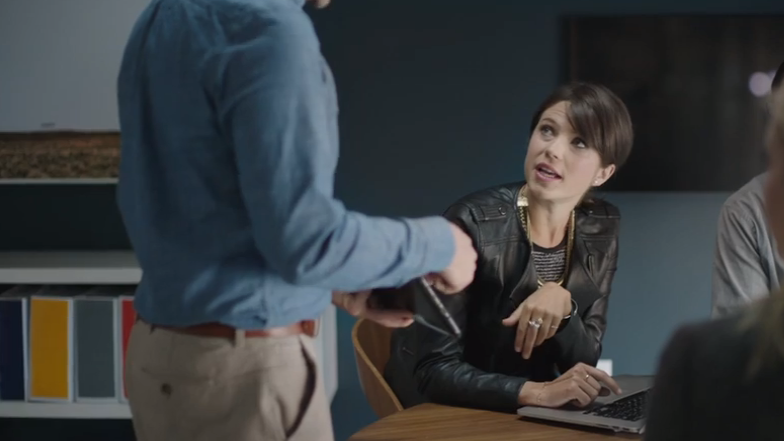It's Time to Stop Apologizing
#SorryNotSorry

Select the newsletters you’d like to receive. Then, add your email to sign up.
You are now subscribed
Your newsletter sign-up was successful
Want to add more newsletters?

Delivered daily
Marie Claire Daily
Get exclusive access to fashion and beauty trends, hot-off-the-press celebrity news, and more.

Sent weekly on Saturday
Marie Claire Self Checkout
Exclusive access to expert shopping and styling advice from Nikki Ogunnaike, Marie Claire's editor-in-chief.

Once a week
Maire Claire Face Forward
Insider tips and recommendations for skin, hair, makeup, nails and more from Hannah Baxter, Marie Claire's beauty director.

Once a week
Livingetc
Your shortcut to the now and the next in contemporary home decoration, from designing a fashion-forward kitchen to decoding color schemes, and the latest interiors trends.

Delivered Daily
Homes & Gardens
The ultimate interior design resource from the world's leading experts - discover inspiring decorating ideas, color scheming know-how, garden inspiration and shopping expertise.
When you think about how often do we start our sentences with "sorry," it's honestly alarming. Women tend to apologize before asking a question, when requesting a colleague's time, or even when someone bumps into them.
This past winter, Pantene launched its Shine Strong campaign, igniting conversations about gender labels in the workplace. The brand's survey on gender equality conducted last year found that 80 percent of all people agree that women are held to different standard than men. The sort of good news: 80 percent of women believe they are making an uphill climb in being treated equal to men by society, meaning we're on the way there.
We've too long been faced with the belief that men make better business executives and political leaders than women do. We know women make great leaders and can own any career without gender inequalities getting in the way, but women need to feel empowered to do so.
The #ShineStrong campaign released a new video today addressing the subtle, but powerful behavior of "over-apologizing" that can be interpreted as minimizing a woman's strength. See the new video below:
We spoke with Colleen Jay, President of Global Retail Hair Care & Color at P&G, on her own experiences with gender equality while climbing the corporate ladder.
What was your major in college?
I am an Honors Business graduate.
Was your plan to always become a woman executive?
Early on in life I actually wanted to be a teacher, but that ambition changed over time to business. But-no matter what the "end game" was, my goal since I was young was to be in a position where I could make decisions and lead people and make a difference. As a woman, I have always felt empowered to speak my mind and not let anyone hold me back.
Get exclusive access to fashion and beauty trends, hot-off-the-press celebrity news, and more.
What has been your drive in achieving your career goals?
Part of being a leader is both learning from and empowering the people around you. I've been very fortunate to be surrounded by and working with strong women and they have all played a big role in inspiring me to reach my goals.
How have you overcome gender inequality as you've made your way up the corporate ladder?
I've been fortunate to work with great people at P&G who have a strong sense of gender equality. However, there have definitely been moments in my career where I knew I had to work extra hard to prove that I could be as good as, if not better, than my male counterpart. My strength to overcome inequality has always come from within — I believe in myself and have never been afraid to take chances. I have 3 daughters and they play an incredibly important role in my life as you can imagine. There have been many times where I've made "life balance" decisions that are important to me and my family. But, you sometimes feel as a woman that you have to work that "little bit extra" to prove that the time you spent at that kids' Dr appointment, or that amazing school play that just happened to be squarely in the middle of the afternoon isn't impacting what you get done in a day or a week or a month. I think I've always been compensated fairly — in absolute and according to the results I delivered. I am fortunate at P&G that pay is inextricably linked to your performance — not your gender!
Other than "sorry" what are other common things you've seen women do in the workplace that discredits their leadership?
I think we can all relate to "unconscious over-apologizing." I've certainly done it and I know I've seen it in others. But, once you are aware it is so much easier to provide candid feedback on this behavior. Even if inadvertent it can frankly diminish not just your message but, over time, your strength as a potential leader. Another common subtlety I've noticed in the language women use is that we often will make "suggestions" — for example "maybe we could..." — versus affirming our opinions. This is one area I have encouraged women to be aware of and that I am very conscious of myself. Ensure your point of view and opinion is heard and people will respect your ideas.
Why do you think women do these things?
I think many women have been pre-conditioned to be careful NOT to come off as "pushy" or "bossy" and, therefore, we soften our language and approach. But — awareness is the first step to addressing it!

Photo Credit: Pantene
Related:
Mind the Gap On Your Way Up the Corporate Ladder
6 Surprising Reasons You're Being Paid Less Than a Man
7 Blatantly Sexist Things Men Say to Us Every Day (That We Often Overlook)